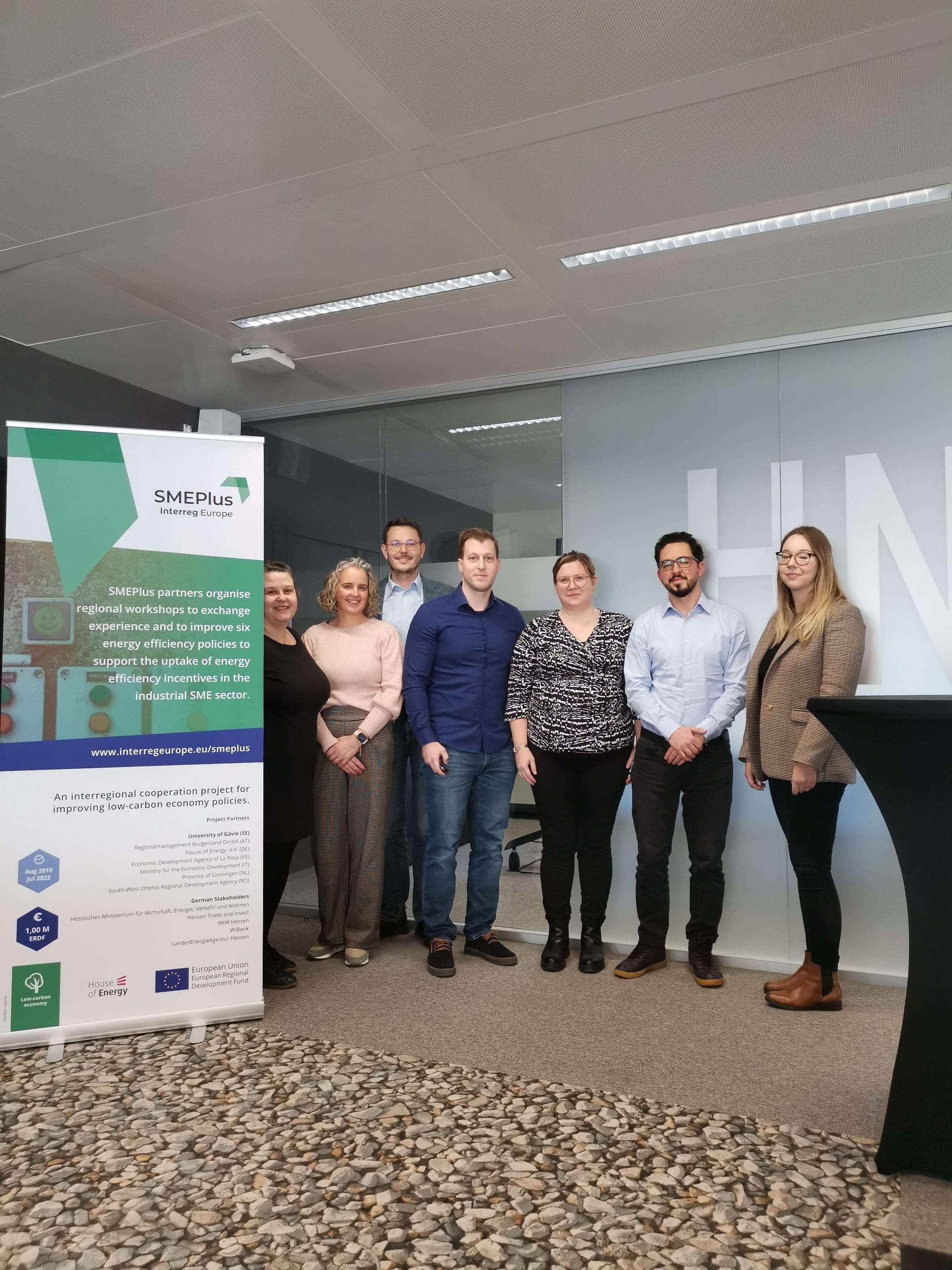
it's a wrap! SMEPlus final event
Thank you all who participated in the success of the SMEPlus project!
SMEPlus project helps SMEs to increase their energy efficiency. The partner regions will compare & rethink their energy policies, liaise with important stakeholders, exchange solutions and improve their instruments towards SMEs. As industrial SMEs represent 95% of the companies, their impact on economies is immense.
The European Parliament set a binding target of increasing, by a minimum of 32,5%, the energy efficiency by 2030 compared to the 2005 level, in all Member States. Therefore, the project partners are sharing their good practices to find the best solutions to contribute to the achievement of the target set. Engaging in discussions and exchanging experiences with relevant actors is the best way to find solutions to increase the involvement of the industrial SMEs in energy efficiency improvement. Common barriers to overcome in the regions are the low interest of industrial SMEs participating in energy efficiency policy programmes as well as low number of industrial SME energy efficiency policy programmes.
The Interreg Europe programme aims at enhancing policies and policy preconditions in different thematic fields. To reach this it is important to establish regional networks and stakeholder groups. Thus, as a first step, the SMEPlus partners will identify major regional stakeholders involved in energy efficiency in SMEs in their regions. Political, economic and social preconditions will lead to individual stakeholder groups in the partner regions, including municipalities, business associations environmental protection agencies, etc. To be able to use their experience, expertise and networks, a series of regional stakeholder meetings will take place. The first stakeholder meetings will be organised in Austria (March 2020) and Romania (May 2020).
The project partners will a) improve the energy policies by 2020 by exchanging and comparing the regional policy instruments in the eight regions, b) jointly develop regional policy action plans supporting the implementation of energy efficiency programmes and thus utilize the potential in the industrial SME sector c) exchange information and experience and by this help the stakeholders supporting the regional action plans set to overcome the barriers.
Therefore, our actions will a) increase the interest of industrial SMEs in participating in the energy efficiency policy programmes, b) support starting-up effective industrial SME´ energy efficiency policy programmes, c) help integrate energy-related policy measures from other sectors in the industrial SME sector.

The exchange of experience, workshops and study visits with the stakeholders will help us achieve project´s objectives. The jointly developed regional action plans will also influence the policies for the next Regional Operational Programme period 2021-2027.
€1,171,830.00
Low-carbon economy
Improving the competitiveness of SMEs, through the two investment priorities, with a total allocation of 48,72 million €:
Economic development associated with the action of energy efficiency is one of the fastest and most effective ways to support regional capital growth under conditions of respect, protection of the environment and conservation of resources.
Starting from the fact that rationalization of energy consumption in the context of efficient management represents the main value of the enterprise, through this project we intend to identify energy efficiency models for the industrial SMEs based on the SMEP2.0 project´s outputs. At the regional level, we will set up an analysis of the energy efficiency in this sector to foresee regional energy efficiency improvement by the capitalization of the industrial SME’s energy-saving potential.
This policy should be improved to support the increase of energy efficiency in the industrial SME sector.
The objective of this program is to accelerate the energy transition in the region.
The program has 3 themes: Energy efficiency, Sustainable Energy and Changing the Energy System. The project 'Energy Efficiency for Industries', under the first theme, has a high priority: energy that is not used doesn't have to be generated (by space consuming wind turbines and solar panels).
The main goal of this project is to achieve energy efficiency in industrial SMEs, using a combination of stimulation and law enforcement based on the Dutch Environmental Law. This law states that SMEs that use more than 50.000 kWh electricity or more than 25.000 m3 natural gas equivalents are mandatory to take all energy-efficiency measures that have a return on investment of 5 years or less. In September 2017 we started the project that combines stimulation, awareness and advice with law enforcement. We expect the first results beginning of 2019. We work together with the municipalities in the province and with organizations and platforms for SMEs.
The program and the project end in December 2019. In 2019 the new Energy Transition Program will be written. If we compare our good practices and lessons will be learned with our SMEP2.0+ project partners, we can improve our policy instrument, the approach of SMEs and energy efficiency in SMEs for the years after 2019 and embody it in the new Energy Transition Program, which will also provide the funding.
Priority objective 4b: Promotion of energy efficiency and use of renewable energies. Characteristics: The objective is to reduce greenhouse gases, energy consumption and energy production and increase the use of renewables energies for production. We are yet far from objectives of 2020 European Strategy and therefore have to develop investments our policy to assure positive energy efficiency under the low-carbon economy axis 4.2: Investments to reduce greenhouse effect emissions by improving energy efficiency in all economic sectors including industrial through financial support.
Policy measures to promote energy efficiency and renewables:
The policy should be improved by the following measures to support more the industrial SME sector:
The OP's main priorities for our interest: Enhancing the competitiveness of SMEs. Support for the reduction of C02 emissions (43m€), Goal 4b: Support of the energy efficiency and use of renewable energy in enterprises (13m€).
The PlUS-Beratung (Production Integrated Environment Protection) was launched in 2008 and integrated into the OP 2014-2020. The goal of PlUS-Beratung is to advise SMEs on realising their potential for improving energy and resource efficiency by optimising their production processes. Around 180 enterprises have received funded consulting. Evaluations of the impact of PlUS-Beratung pointed out that the identified potentials for improving efficiency were not always realised. To close the gap between identified efficiency potential and realised potential the Hessian government has widened their PIUS support and created the funding program PI US-Invest, launched in March 2017. For both programs 13 m€ are available. With PIUS-Invest SMEs can now receive up to 30% funding for their investments leading to a reduction of C02 emissions.
OP's specific expected result supported by PI US-Invest
There are still a lot of hurdles to overcome before reaching the national targets of C02 emissions reduction. The minimal impact for PIUS-Invest is to reduce C02 emissions by 12.600 tons per year. The responsible body is very interested in improving their PIUS support programs even further and maximising their impact regarding C02 emissions reduction.
Promotion and reduction of CO2 emissions in all economic sectors. Measure M11: Company investment in renewable energies and energy efficiency (6.5m€).
Aim: Contributing to the increase in energy efficiency and share of renewable energies in enterprises to achieve the climate and energy targets of the Europe 2020 strategy.
The financial subsidies offered to the companies include measures for the expansion of the use of renewable energies as well as energy saving, air-conditioning and cooling, thermal building renovation and raw material management Measure M16 (1.5m€) F&E&I- Research projects with CO2 relevant measures.
Aim: Contribution to the increase in the number of R&D Employees in the field of environmental protection.
Projects in the fields of renewable energies, energy technologies and energy-efficient CO2-related solutions.
The reason why it should be improved is that too few SMEs have so far claimed these possibilities. An international comparison showed, that the region Burgenland has deficiencies in the area of energy efficiency. Therefore, appropriate measures were taken to support enterprises in the area of energy efficiency. An evaluation shows that the proposed measures are not sufficient to achieve the goals and that funding instruments are not utilised as desired by the SME. Sufficient activities are set up in industrial SME to increase energy efficiency. This is to be achieved by learning the best practice from the other regions in the SMEPlus.
The National Operational Programme Enterprises and Competitiveness 2014-2020 (NOP EC) has an overall budget of 3.28 billion€ circa, comprehensive of the budget increment made by the European Commission thorough Decision C (2017) 8390 of 07.12.2017, which involved the extension of the NOP EC’s territorial area, for some of its Axis, from South Italy to whole Italy.
NOP EC’s main goal is to increase investments in key sectors like research and innovation, competitiveness, environmental protection and energy efficiency. NOP EC is broken down into four Axis, each of them targeting one specific Thematic Objective (TO1 “Innovation” - Axis 1; TO2 “Broadband” - Axis 2; TO3 “SMEs competitiveness” – Axis 3; TO4 “Energy efficiency” – Axis 4).
Axis 4, addressed only to South Italy, sets out a specific Action, “4.2.1” with a financial allocation of 153 m€, stimulating energy efficiency and the reduction of energy consumption and climate-changing gas emissions from enterprises and production areas. This includes the installation of renewable energy production plants for self-consumption, giving priority to high-efficiency technologies on the base of the experiences made by MiSE in the past programming period (see “Interregional Operational Programme Renewable Energies and Energy Efficiency ERDF 2007-2013”).
NOP EC, Axis 4, should be improved in order to accelerate the energy efficiency transition by industrial SMEs, energy production from renewables and a low carbon economy.

Thank you all who participated in the success of the SMEPlus project!

Project Partners in a Race Against Time: Can They Beat the Inevitable?
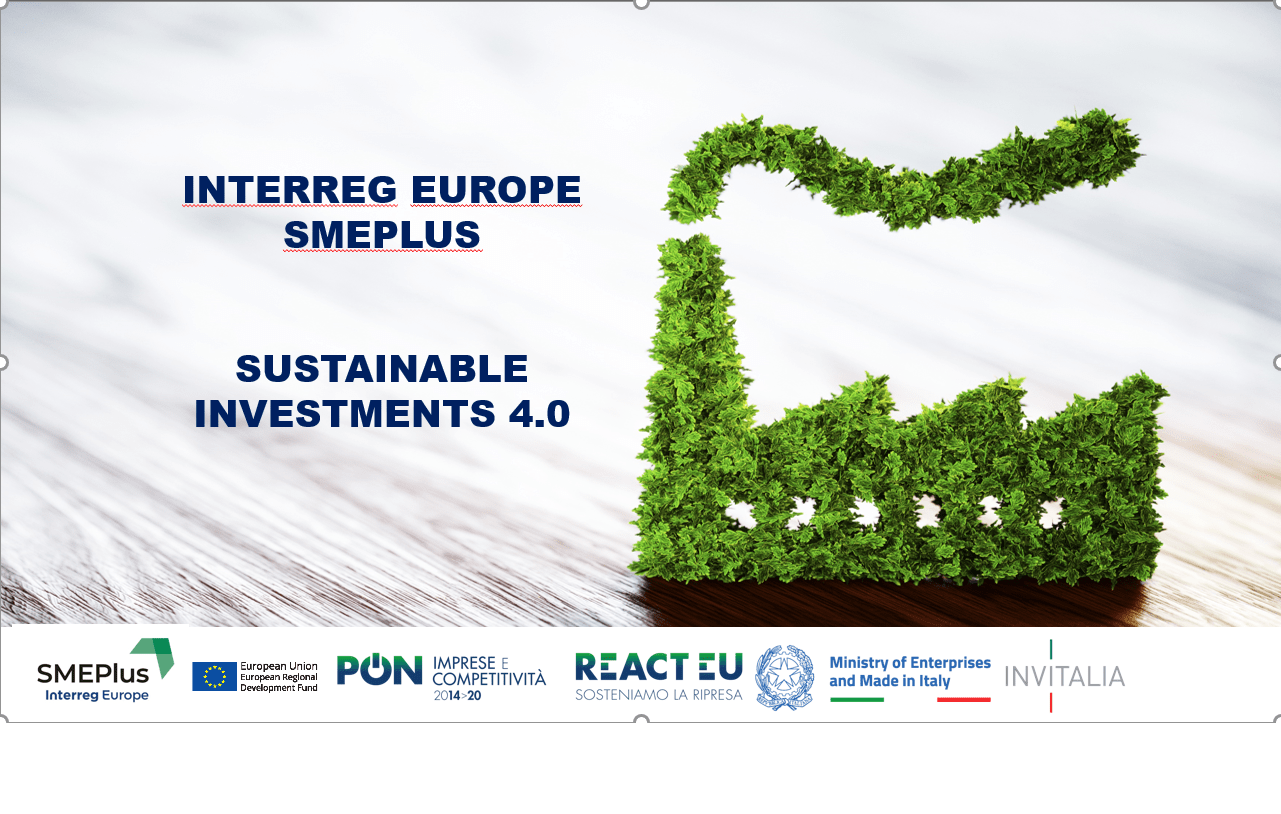
The desk for the call ”Sustainable Investments 4.0”, opened on 18th May 2022, and it will be closed by Decree of the General Director DGIAI on 25th January ...

Action 1 continued until the end of Phase 2 by using the tool for another 7 SMEs in order to collect data and estimate the energy savings. Action 2 started in
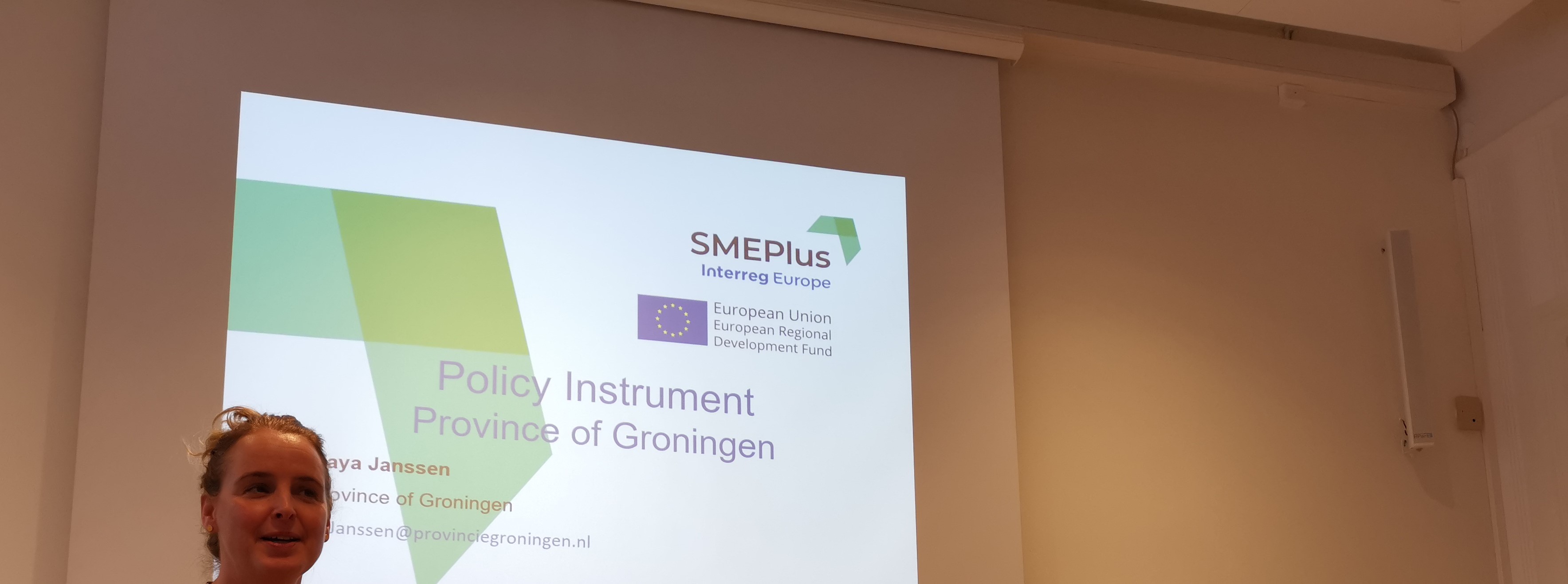
On the 20th of December 2022 at 14:00h we held a meeting with our stakeholders. Later that afternoon, at 15:00h, representatives from the Ministry of Internal
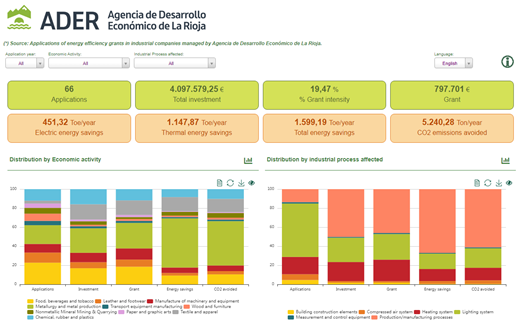
To date, the two actions of the Spanish action plan are ongoing or have been successfully implemented.
The MINUS program, action 1 of the plan, is being succe...

The SMEPlus partners and stakeholders will meet in person as well as join online the final SMEPlus event, that will take place in a hybrid form on 18 January
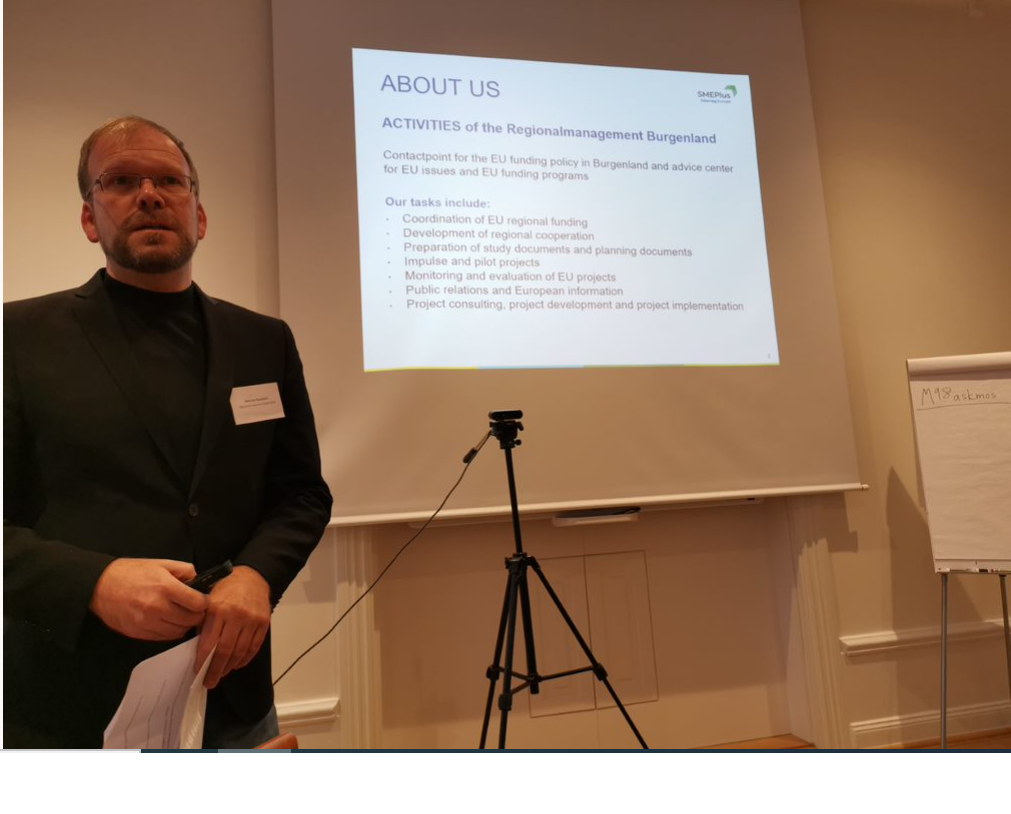
The assessment phase, which continued to be ongoing, has been extended and includes two more meetings on 16.06.2022, and 30.09.2022 with 12 stakeholders parti

Italian Action Plan consisted of a modification of an existing policy instrument, whose main implementation tool was the call for proposals “New Innovative Ma.
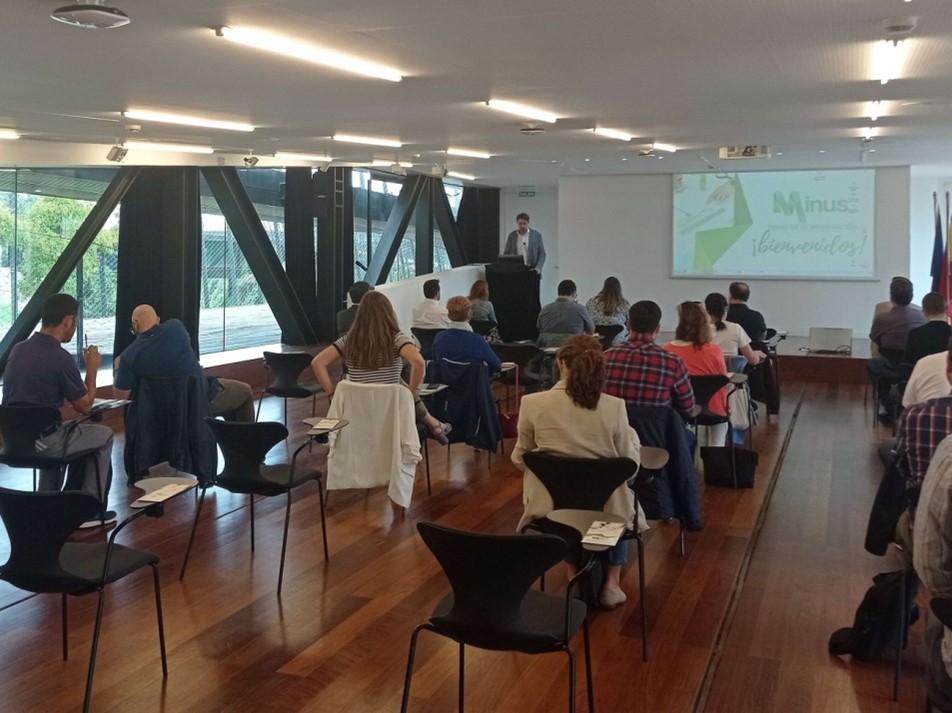
La Rioja's action plan continues with its implementation during phase 2 of the SMEPlus project.
Action 1 has been developed during the first months of the ye...